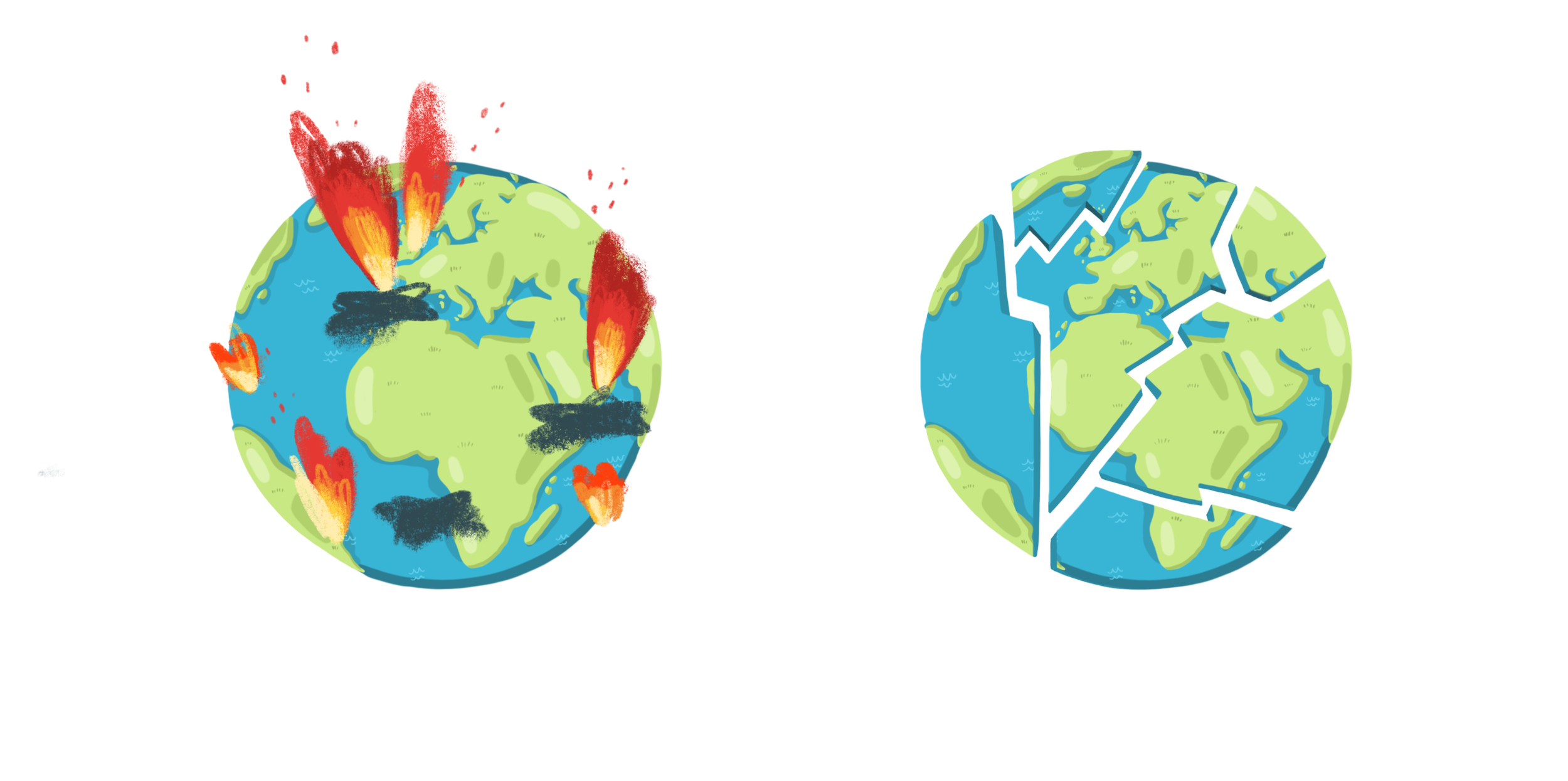We need to rethink Climate Justice. By Natalie Armitage
Natalie Armitage is an Earth Justice Consultant who works presently between the UK and Jamaica to resource and grow Caribbean-led regenerative permaculture solutions to prioritise indigenous land-based practices. Having worked in the Charity & Philanthropy sector in the UK and internationally for over 15 years; she is now committed to re-joining the link between racial justice, climate justice, extractivism, land justice and indigenous wisdom. These links are essential for us to collectively understand in order to save the Earth from complete destruction. Natalie will be helping us to transform our approach through our new series: Rethinking Climate Justice.
What are the familiar images or words that pop up when a chronic fear of environmental doom (otherwise known as eco-anxiety) comes to take you out?
The Climate Crisis / Oil Spills / Deep Sea Mining / Environmental Protection / Green Spaces and Community Gardens / Nature Preservation / Green technology / Reducing Carbon Footprints / Recycling / Waste Management / Slow Fashion / Activism / Sea Levels / Extinction / Global Warming
…or just an internal scream HELP WE ARE BURNING IN HELL AND NO END IS IN SIGHT everytime you pay the 10p because you forgot your bag for life?
All of the above might be included. As we dive into our work to rethink Climate Justice, first let’s establish what we don’t mean. Then, look at what the term Climate Justice broadly means in today’s discourse in the UK and what it still doesn’t quite address.
What we don’t mean: ‘The Climate Crisis’
‘The Climate Crisis’ is in fact, a very real problem. Despite Trump calling it a ‘hoax’ - it is absolutely scientifically proven that global warming (a rise in temperature of the planet) is absolutely real. It is harming every single ecosystem of the planet irreversibly, escalating over several decades, that will eventually kill off life itself as we know it. So, if you happen to care about anything living on planet earth including entire populations, it is definitely an emergency for anyone. However, unintentionally, ‘The Climate Crisis’ also alludes to a simplification of what needs to be addressed in a way that does not necessarily show the full picture. Here are a few assumptions it alludes to:
The Climate is the only metric we can use to quantify the danger Earth is currently in. By presenting it as a single factor that affects every ecosystem on planet earth (even though it is arguably the main one) - it evades mentioning the man-made systems of extraction that have spread exponentially out of control, directly causing multiple genocides happening right now.
The Climate Crisis has only become an urgent emergency in recent history. It appears to be separated from the ‘COVID Global Pandemic’ or the ‘Refugee Crisis’, the ‘Mental Health Crisis’, the ‘Economic Crisis’ and the ‘Homelessness Crisis’ and the many other crises that are all competing for our urgent attention at once. It suggests that ‘the climate crisis’ is a stand alone problem that everyone needs to unify on - not necessarily a symptom of the same problem that causes all of the crises above.
The “First World” countries that caused the climate crisis, need to offload more private capital they have accumulated to all the “poor countries” to just…sort it out. It leaves out the reality that countries considered “poorer” are dealing with the worst of its effects today; all while simultaneously dealing with imperialist, white supremist, colonial capitalism that extracts the life out of them, without ever receiving any kind of real reparation or restoration efforts. Whilst the discourse keeps affirming that “developed countries” need to keep throwing money with urgency at those who are “still developing”. It is implied that “developed countries” seem to have all the answers on adapting consumer culture to survive - without ever considering the entire ending of it.
‘Innovation’ is going to save us. The most ‘innovative solutions’ results in MORE start-up companies thriving on capitalism and gentrification to create ideas that seem to get the most merit and funding, because it is widely believed that people who went to Harvard or Cambridge are more intelligent than literal Mother Nature and indigenous communities. Those same ‘innovators’ - who often adopt indigenous approaches - are still treated as having more credibility and expertise than the indigenous people whose knowledge that they have stolen. Still to this day.
Capitalism is the problem and therefore the only way to imagine a solution. Green tech, clean-tech and climate tech needs to bag more capital investment as a solution to a problem that was created by capital and mass production itself. Yes, it is literally that contradicting. You may already be aware of what is happening as a result of further extraction from the Congo for cobalt, to make some of these “tech solutions” that are supposed to “develop us”, quite squarely on Black lives.
Why is this not the same as Climate Justice? It promotes a never ending series of adaptations of an oppressive machine that refuses to end in any way. These patchy solutions might reduce statistics, but ultimately keep breeding (sometimes even exacerbating): a disproportionate impact on Black people, panic and trauma reactive nervous systems that result in knee-jerk quick fixes that make no real change, reform but no abolition and high amounts of capital inventing more start-up solutions marketed as exciting with unaddressed root problems.
What it is actually sustaining in the world of ‘sustainability’, is perpetual avoidance of the root problem that is ever escalating: Extractivism. Extractivism is an integral part of a white supremacy culture (hand in hand with imperialism, colonialism, capitalism and cis-hetero patriarchy); that extracts from people, communities, land and earth to fuel the top 2% above the global majority to sustain its existence and escalation, at all costs. Even in the face of the Earth’s demise, it is so entrenched internally, interpersonally, institutionally and structurally it isn’t stopping- even when the people who benefit the most from it are also in danger. The next extraction project appears to be other planets, as a result.
What we do mean: Climate Justice including social justice and anti-racism
Ok, we are getting warmer (pun intended). No Justice, No Peace. You just need to look at the array of impacts by the rising climate to know Mother Nature is certainly not at peace right now.
‘Justice’ takes us out of understanding environmental issues as something happening to an objective natural world eco-system by humans at large, and brings in many human ecosystems that are connected to and causing the destruction of our planet. It brings us closer to the reality often denied: inequitable systems of oppression have the most to do with it.
“Climate justice connects the climate crisis to the social, racial and environmental issues in which it is deeply entangled. It recognizes the disproportionate impacts of climate change on low-income and BIPOC communities around the world, the people and places least responsible for the problem.” - Center for Climate Justice, University of California
Here we see a reference to the term “BIPOC” which stands for Black, Indigenous, People of Colour that is often used in the US to describe what we know as Black and racially minoritised groups in the UK. Some people use “Global Majority” to indicate that the majority of people that are in the majority on planet Earth are actually not white. Climate Justice includes everyone oppressed by systemic violence, who are disproportionately impacted in every single way. This is also why Climate Justice includes anti-racism and Black Liberation at large.
However, sometimes the narrative gets hijacked to become about “Diversity, Equality and Inclusion” for Black and racially minoritised people in the “Climate Space”. Whilst it is extremely important for the knowledges and experiences of Black and racially minoritised people to be central to climate work, as we say in all of our work, this is a low bar to aspire to and won’t achieve the results we need. In the same way we recognise that DEI is not anti-racism; we can also acknowledge that we are not fighting for inclusion into the Environmental Movement spaces only, we need a whole U-haul of an entire system of oppression built on the backbone of extractivism.
We are not just fighting for inclusion into the system killing us - we are fighting for a total end and abolition of its extractivist violence in all its forms.
Quite simply - we have to understand Extractivism as a key part of white supremacist culture, and how we are all affected by it whether we live in close proximity to whiteness or not. Ending all occupations. Ending of all open-air prisons of people who are relentlessly subject to the Global North's mass extraction from their bodies, land, culture, labour and resources with one hand, whilst dumping their visa privileged (usually white) tourists who stamp all over and trash their land and their identities with the other.
In Mikeala Loach’s book “It’s Not That Radical” she beautifully exemplifies one way she has attempted to do this by connecting all the root issues from a Black feminist perspective. Ultimately - as her title implies - the ‘radical’ label that is placed on valuing Black lives, is actually very basic humanity.
“One problem with the current movement in the UK is that, too often, we know what we are fighting against, but we don’t know what we’re fighting for. We are very clear that we want to stop certain things, but we put less attention on imagining what we are trying to build.”





